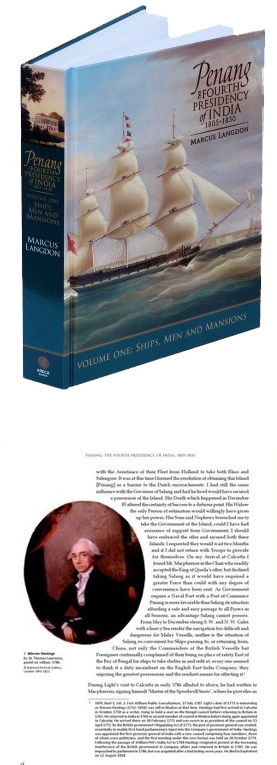30 April 2014: Penang – The Fourth Presidency of India November 3, 2014 – Posted in: Newsletters
 An in-depth and compelling narrative of a fascinating period in Penang’s history
An in-depth and compelling narrative of a fascinating period in Penang’s history
Langdon has accomplished a book that no person interested in Penang’s past can do without. It is finely produced with an impressive array of illustrations, and is clearly one of the finest books on the first decades of the island’s history. — Ooi Kee Beng, Penang Monthly
Marcus Langdon’s Penang: The Fourth Presidency of India — a flagship title from our catalogue — has been highly commended in a recent review by Dr. Ooi Kee Beng. This book has also been listed among the 50 Best Malaysian Titles of 2013 by Malaysia’s National Book council. To purchase, please visit our website or drop by our bookstore. Thank you!
Penang: The Fourth Presidency of India has been extensively reviewed by Ooi Kee Beng for Penang Monthly. Starting with the intriguing premise about several ‘niggling’ questions on the history of Penang (none of which were satisfactorily answered in any Malaysian schoolbook) Ooi deepens the argument by positing that “national history has successively been caricatured to serve narrow political agendas”. “Political simplification of the past”, he continues, “is theft of a cruel kind since it seeks to hide information that holds profound meaning for all of us now living.” An honest revision of history therefore requires the writer to rely heavily on empirical evidence and dedicated inquiry. Having achieved this, Langdon should be warmly congratulated for providing history buffs with the answers to the many questions about Penang’s history.
Soon after its launch, the book garnered positive critical reviews from academicians. In an interview published in Huffington Post, Marcus Langdon was described as “the leading authority on Penang’s early history under the East India Company.” Geoff Wade of the Institute of Southeast Asian Studies, Singapore called it ‘the most detailed account ever to be written of the Settlement of Penang in the first thirty years of its existence. These are all well deserving accolades. Placed alongside other accounts documenting the period of the East India Company in Penang, Penang: The Fourth Presidency of India stands literally alone. Scantly reminiscent of, but not intellectually similar to Samuel Pepys’ diary of 17th century England, Langdon constructs his essays through sources such as the minutes of council and department meetings, private correspondences and newspapers — things which casual historians would most likely ignore. The focus of Volume 1, aptly called Ships, Men and Mansions focuses on the roles played by shipbuilding, political personalities and historically significant buildings. Penang: The Fourth Presidency of India is the first volume in a series of three. It is available now from Areca Books.
